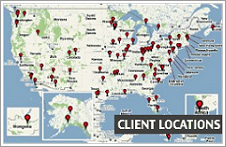Here’s how a few index cards can strengthen your team
In case you’re wondering, the answer is no. You don’t need to be an expert facilitator or a miracle worker to bring out the strengths and tighten the bonds of your work group. But you do need to try new things – and that’s what this quick group activity is all about. It works great with any team numbering up to about 15 people. It uncovers everyone’s strengths in a constructive and co-creative way. Best of all, the benefits are powerful and long-lasting. In terms of materials, all you need are small envelopes, index cards, and a pen or marker for each person. Before the group meets, put one blank card in each envelope. When the group is together, give each person a quantity of envelopes/cards matching the total number of people in the team. (If the team numbers 10 people, give each person 10 envelopes, each containing a single index card.) Now give these simple instructions to everyone: • Write your name on the outside of each envelope in your stack. Leave the index card inside and untouched. (If there are 10 people in the group, you’ll write your name on all 10 of the envelopes.) • Keep one of the envelopes (with your own name on it) for yourself, then circulate all the other envelopes to everyone in the room – so that each person gets one envelope from everyone else. (Back to our example group of 10 people: Each person would end up with a new stack of 10 envelopes, each addressed with the name of a different team member, including one envelope with their own name.) • Now for the heart of the activity: Take one of the envelopes, noticing the name that’s written on it. Think positively about this co-worker. Reflect on some of your positive interactions with them – and some of the positive things you’ve seen in their interactions with others. Look for words that capture their positive qualities. Then take the index card, write down what you view as their greatest one or two strengths, put the index card back in the envelope, and seal it. • Take a second envelope from your stack, with the name of another person written on it, and repeat the activity. Do this for all the envelopes/people, so that you’re thinking positive and documenting the strengths of everyone in the group. • Take enough time...
Read MoreSmart strategies for working with schemers
Does your workplace include a scheming type who seems to play games with people? They’re difficult to work with, but not impossible. The key is to understand what’s happening – and to be ready with a few smart strategies. 1. Many schemers get their way through subtle bribes. They put on a friendly air and vaguely promise to help at some point down the road – in exchange for an immediate favor. Their favorite phrase is “I owe you one.” But they rarely deliver on their promises. When they approach you to make a deal, take a pass. 2. When a game-player turns on you, the best response is a cool head and plenty of unassailable facts. For instance, if a scheming colleague is going behind your back to spread rumors that your project is way over budget, come to the next meeting with the latest figures proving otherwise. Don’t be confrontational – just present the facts, take questions, and let reality clear up any misunderstandings. 3. If the person is more aggressive, actively trying to sabotage your work, find a chance to engage him or her in civil conversation about it when colleagues are around – preferably in a meeting. Explain what you’re seeing and how you interpret it, and ask whether your concerns are justified. Be specific and detailed, but also be concise. End by asking your colleague for their take on things. What you want is to create a public awareness of what’s happening. 4. Don’t forget that scheming types are human beings too. To improve the chemistry of this person’s relationship with you, look for any impromptu opportunity to talk with them about anything that’s unrelated to work. Let’s say the person loves football and you both saw the championship game – then start a conversation about that. Or you see a child’s artwork taped to his office wall – ask about it. You won’t rewrite history or change the person’s neural wiring, but a few sincere comments will likely warm up the situation. By Tom Terez •...
Read MorePay attention – and you’ll find plenty of positives
Birds are unlikely teachers, but I have to confess, they’ve taught me a big lesson in paying attention. It’s a lesson for all of us who want to see the positive things that are going on at work. It began last spring, when a pair of robins moved into our yard. Our family kept tabs on them and enjoyed their presence. Then I bought binoculars. Then I started to go on birdwatching hikes in nearby woods. Then I downloaded a birdwatching app. Then I began learning bird facts and bird songs. Then I began to track my bird sightings. In case you’re wondering, I’m no newcomer to Mother Nature. I’ve been enjoying walks and runs in the woods for years. But when I’m outdoors now, it’s different. My awareness is deeper. I see more. Background sounds have moved up and become clearer. I’m just a novice birdwatcher, but the moment I start walking on a trail, I can’t help but hear the birds. In some cases I can identify the type of bird and what it’s communicating. When I use binoculars to get a sustained close-up view, it’s like I’m seeing birds for the first time. My biggest thrill so far was watching a Baltimore Oriole, aglow in late-evening sunlight, giving a free concert from a top branch. All of this has reminded me to be more attentive – not only in the woods, but also in workplaces and elsewhere. When you start looking for something, you’re going to find it. The more you look, the more you’ll find. And the more you learn about what you’re finding, the more you’ll appreciate it. So start paying attention with greater intention at work. Watch for those interesting, instructive, and inspiring actions that are unfolding in the workplace around you. Watch for the good work. Watch for the great service. You’ll be amazed by how much you see. By Tom Terez •...
Read MoreReality check: Are you doing all you can to earn trust?
5-page self-assessment – 1.1MB We know that trust is crucial to teamwork. We know it’s reciprocal: When you give it, you get it. We know that trust-building takes time. But what about you when it comes to trust? Are you doing everything you can to earn trust and build a trust-filled work environment? Click here for a self-assessment that can serve as a quick reality check. It’s in PDF format, so feel free to print it and fill it out for your own benefit. Too often, trust is talked about in vague generalities. And sometimes our thoughts about trust are all about what we wish others would do to earn our trust. This self-assessment is different. It gets specific, it focuses on behaviors, and it serves as an important look in the mirror. So take a few minutes for this – and get practical insights into what you can do to turn up the trust at work. Download the 5-page self-assessment (PDF 1.1MB) This download is for e-letter subscribers • Sign up for the free Next Level...
Read MoreSpeak the truth, because you can’t evade the radar
Did you know that you come fully equipped with your own radar? Each of your co-workers has one too. So do your customers. Some people call it intuition. Others call it a gut feeling. It detects things as they really are, alerting people whenever someone is giving them an incomplete or inaccurate version of the truth. This internal radar is rarely fooled, so please take note: If you’re planning to do some verbal gymnastics during your next team meeting to hide the fact that you’re late with an assignment, think twice. People will sense that you’re not playing straight. If a co-worker asks for your feedback after doing an awful job, resist the urge to issue a fake “just fine.” Over time, false compliments get discovered, and your words will lose all weight. You can be candid and kind when giving feedback. If you don’t think you can, then bounce back the question and ask the asker how they think they did. If you’re approaching a busy colleague to recruit them for your project team, and you’re tempted to downplay the amount of work that’s likely to be involved, don’t do it. Your would-be team member will pick up on it. This radar is wired into us. Back in cave-dwelling days, people faced danger at every turn, so they had to assess, interpret, and respond all the time. Those who were best at this ended up living longer, sending an ever-stronger intuition up the generational line – all the way to us. Think about your own internal radar. When someone tries to slide something past you, you usually catch on quickly, right? Yes you do – and the same goes for just about everyone else. Keep that in mind the next time you’re tempted to slip your message beneath the radar. By Tom Terez •...
Read MoreAre you crushing creativity with your nonverbals?
If a face can launch a thousand ships, can it also kill a thousand ideas? My guess is yes. Some time ago, my work path crossed with someone we’ll call Helen. She seemed plenty nice, but whenever she heard an idea that didn’t fit her way of thinking, she’d say so with her face. Her lips would tighten. Her mouth would twist to one side. Her eyebrows would knit together. Sometimes her head would tilt. Without any words, Helen seemed to be saying: Your idea stinks. When she went on to speak, her words often matched her expression. She would begin with skepticism. I can’t say that Helen sunk a thousand ideas – I wasn’t keeping count. But she sunk some of mine, and she kept other ideas from setting sail. I became so intent on avoiding her negative expression that I stopped coming forward with new ideas. The whole experience got me thinking about the signals I might be sending. It reminded me to turn up my self-awareness. Facial expressions are like pictures – they’re worth a thousand words. Let’s use them for good. By Tom Terez •...
Read MoreWhen no action is the best action
When you’re hit with a sudden situation where you want to react, hit the pause button. Give yourself time to think it through so you can take wise action.
Read More



